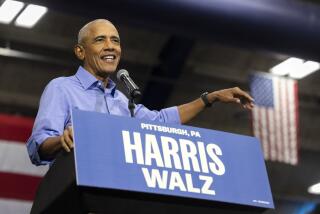President Obama is absolutely not the ‘race-baiter in chief’
- Share via
President Obama joined the national conversation on race Friday, addressing the death of Trayvon Martin, the slain Florida teenager whose main offense seems to have been his skin color. After a week of protests in the wake of shooter George Zimmerman’s acquittal, some of which lamentably turned violent, Obama spoke of the pain felt in the African American community.
“I think it’s important to recognize that the African American community is looking at this issue through a set of experiences and a history that — that doesn’t go away,” the president said. He continued:
There are very few African American men in this country who haven’t had the experience of being followed when they were shopping in a department store. That includes me.
And there are very few African American men who haven’t had the experience of walking across the street and hearing the locks click on the doors of cars. That happens to me, at least before I was a senator. There are very few African Americans who haven’t had the experience of getting on an elevator and a woman clutching her purse nervously and holding her breath until she had a chance to get off. That happens often.
And he posed this question to Americans who aren’t open to challenging the “stand your ground” law that let Zimmerman shoot Martin in self-defense:
And for those who resist that idea that we should think about something like these ‘stand your ground’ laws, I just ask people to consider if Trayvon Martin was of age and armed, could he have stood his ground on that sidewalk? And do we actually think that he would have been justified in shooting Mr. Zimmerman, who had followed him in a car, because he felt threatened?
The Atlantic’s prolific Ta-Neshi Coates has written frequently on the Martin case since news of Zimmerman’s acquittal broke Saturday, including this must-read: “The Banality of Richard Cohen and Racist Profiling.” Still, it’s “The Good, Racist People,” an Op-Ed he wrote for the New York Times in March, that I can’t stop thinking about. In it, he details an incident that happened at his neighborhood deli in New York, where an employee accused Oscar-winning actor Forest Whitaker of shoplifting and then frisked him.
“In modern America we believe racism to be the property of the uniquely villainous and morally deformed, the ideology of trolls, gorgons and orcs. We believe this even when we are actually being racist,” Coates wrote, arguing that we live in a society that targets black people with “a kind of invisible violence.” He goes on:
The idea that racism lives in the heart of particularly evil individuals, as opposed to the heart of a democratic society, is reinforcing to anyone who might, from time to time, find their tongue sprinting ahead of their discretion. We can forgive Whitaker’s assailant. Much harder to forgive is all that makes Whitaker stand out in the first place. New York is a city, like most in America, that bears the scars of redlining, blockbusting and urban renewal. The ghost of those policies haunts us in a wealth gap between blacks and whites that has actually gotten worse over the past 20 years. […]
I am trying to see Sean Penn or Nicolas Cage being frisked at an upscale deli, and I find myself laughing in the dark. It is worth considering the messaging here. It says to black kids: “Don’t leave home. They don’t want you around.” It is messaging propagated by moral people.
It’s hard to read Coates’ Op-Ed without your heart rising into your throat. But we should read it, all of it. And we should appreciate that Obama, our first black president, has joined the conversation on race with such a personal and thoughtful statement. Here’s the full transcript.
Some accuse Obama of race-baiting and stoking racial tensions. But that’s not fair, and it’s not what he did. What the president did was make himself relatable, and then he used his position of power to suggest a path forward for a “more perfect union.”
The people who object to Obama saying that we need to “bolster and reinforce our African American boys” are just in the way.
ALSO:
Immigration reform: It’s alive!
Follow Alexandra Le Tellier on Twitter @alexletellier
More to Read
A cure for the common opinion
Get thought-provoking perspectives with our weekly newsletter.
You may occasionally receive promotional content from the Los Angeles Times.










